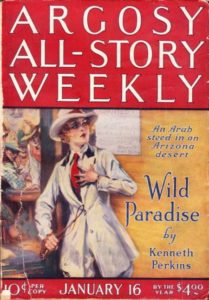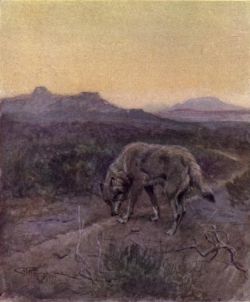 The third issue of Argosy All-Story Weekly for the year 1926 included the first installment of a new serial, Wild Paradise, by Kenneth Perkins; it’s a western adventure concerned with an Arabian stallion. Other serials in the issue include The Vanishing Professor (Part 2 of 4), There Goes the Bride (Part 4 of 5), and Pirate Bold (Part 3 of 3); in my reading this past week, I skipped all of these, as I do whenever I lack some of the parts of a serial. Instead, I concentrated on the works appearing in their entirety, both prose and occasional verse.
The third issue of Argosy All-Story Weekly for the year 1926 included the first installment of a new serial, Wild Paradise, by Kenneth Perkins; it’s a western adventure concerned with an Arabian stallion. Other serials in the issue include The Vanishing Professor (Part 2 of 4), There Goes the Bride (Part 4 of 5), and Pirate Bold (Part 3 of 3); in my reading this past week, I skipped all of these, as I do whenever I lack some of the parts of a serial. Instead, I concentrated on the works appearing in their entirety, both prose and occasional verse.
Paul L. Anderson’s The Trampling Horde, the novelette for the issue offers an enjoyable tale of prehistoric adventure, exploring how a clever but lazy artist might bring about advances such as buildings and husbandry.
The short story “In Line of Duty,” by Don Waters, recounts how a locomotive engineer deals with a son heading down the wrong track in life, while John Holden’s “Eyes That Fear To See” is a romance of a young man who falls in love with the woman who rescued him, temporarily blinded, from a wreck. In Charles Divine’s “The Wise Cracks of Mr. Cotabish,” an officer worker, bullied by his manager and rejected by the woman he loves, travels to the big city, and the journey and his urban adventures make a change in the man. Rather more grim, yet hopeful, is Paul Taylor’s “Dead Man’s Chest,” in which the sea chest of a dead man leads to strife and murder, but finally to more. And the final story in the issue, James Howard Hull’s “Game,” is a mildly amusing account of a timber surveyor’s encounter with a bear family.
Most noteworthy of the occasional verse was “The End of the Trail,” by L. B. Cullen-Jones, about a wild mustang; the poem fittingly followed Wild Paradise in the issue.
Pulp magazine 2 for 2021.
